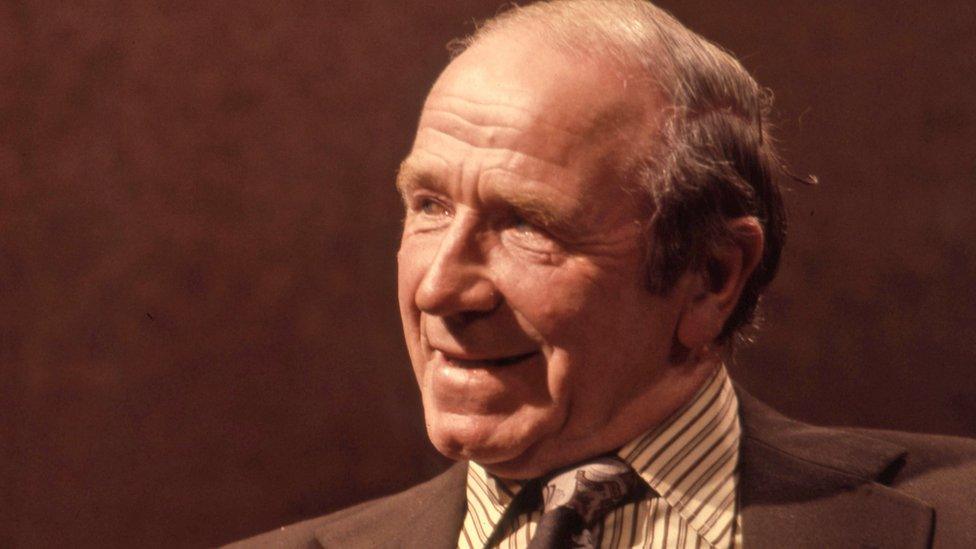Manchester United: Sir Matt Busby film tells 'one of the great football stories'
- Published
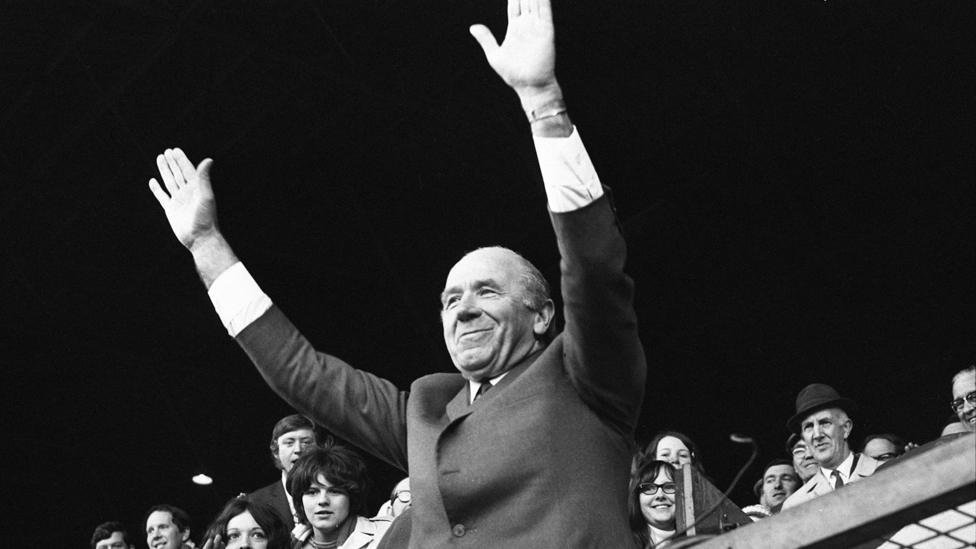
Sir Matt Busby led Manchester United to five league titles, two FA Cups and one European Cup
A new feature documentary, from the makers of The Class of '92 and the Bros film After The Screaming Stops, details how Sir Matt Busby led Manchester United out of the ruins of World War Two, through the tragedy of Munich air disaster and on to European glory.
For many modern Manchester United fans, former manager Sir Alex Ferguson is the GOAT., external
For one of the club's 1968 European Cup-winning heroes, however, Ferguson will forever be "the apprentice" of another great Scot.
"Matt Busby is Manchester United," says John Aston Jr.
"He had a very good apprentice in Alex Ferguson, but he's the man who built it up and he's the guy who put Manchester on the world map."
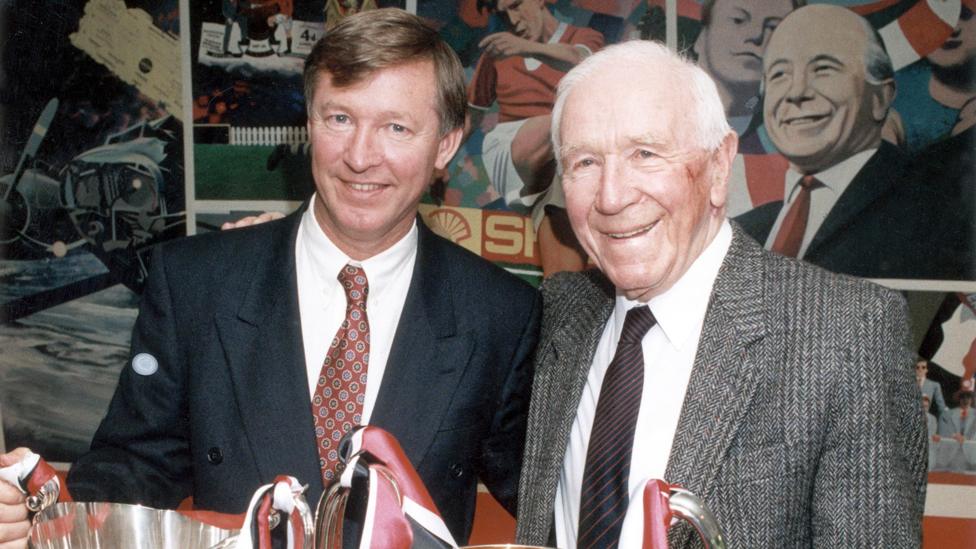
Suit you sirs! Sir Alex Ferguson and Sir Matt Busby with their respective European trophies in 1991
Aston shone on the opposite wing to George Best when Busby's United became the first English club to reach the pinnacle of European football.
Now the 72-year-old appears on camera alongside former team-mates Denis Law, Paddy Crerand and Alex Stepney, as well as Busby's successor Wilf McGuinness, in the film that attempts to explain his legend and legacy.
From Bros to Busby
Titled Busby, the documentary is directed by Joe Pearlman, whose recent work has taken him from Mo Farah to Bros (he got a Bafta nomination for After the Screaming Stops) and now to United.
"There was so much similarity in their stories it felt like the natural move!" he jokes about making the leap from the Goss bros to Busby.
The director sat down with the icon's friends, family and former players to tell "one of the great football stories".
"There is no-one in the game who has as interesting a story as Sir Matt Busby," declares Sunderland fan Pearlman.
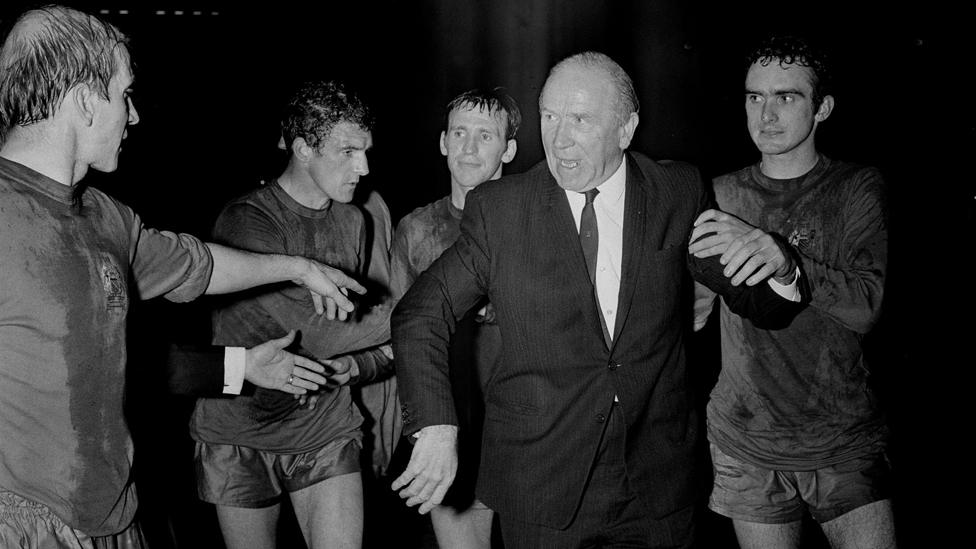
Left-right: Bobby Charlton, Bill Foulkes, Paddy Crerand, Matt Busby and John Aston after United's '68 European Cup win
His eyes lit up when he discovered previously unseen interviews with the often "guarded" Busby - with the help of biographers Eamon Dunphy, Patrick Barclay and Roy Cavanagh.
He then set about trying to "pull out who Busby is" and why people speak about him with such reverence.
"Everyone had grand terms for him, like, 'He should've been the Prime Minister or the Pope'."
'Tremendous presence'
Busby enjoyed a playing career with United's rivals Manchester City and Liverpool, and served as an Army training officer/football coach during the war, before taking his first proper managerial job at United in October 1945.
With the club in debt and its Old Trafford stadium having been bombed by the Nazis, appointing the untried Busby was seen as a risk. But the "forward-thinking" manager oversaw the rebuilding of their ground, and remained there for 25 years.
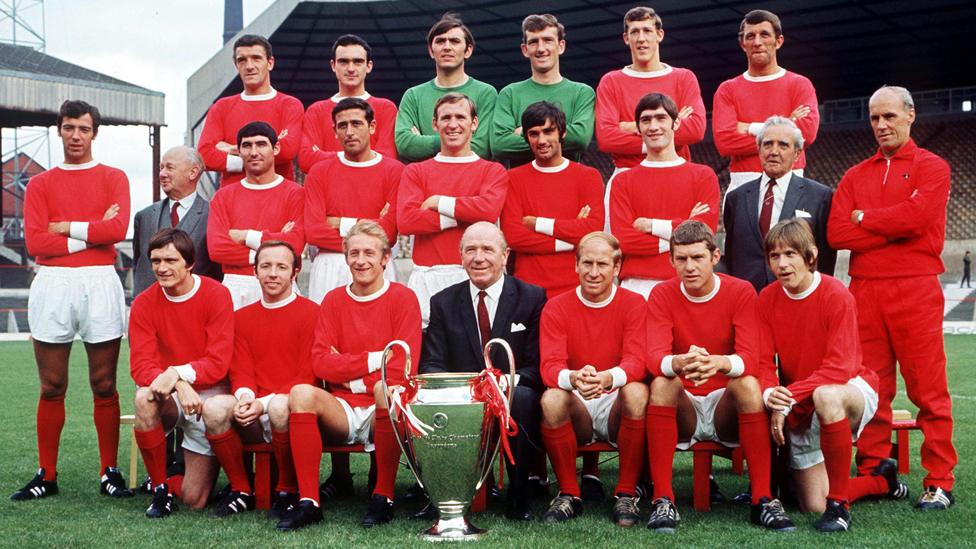
The Manchester United squad pictured with the European Cup in 1968
Aston remembers him as a "moral man" with "a tremendous presence", noting how "when he used to appear in the dressing room a sort of silence fell".
He hasn't forgotten how "tight" he was with the club's money either.
"He had something you can't measure," he says.
'Obsession with youth'
The film shows how, after winning his second league title in 1956, the visionary Busby defied the FA to make his "Babes" the first English side to compete in Europe - declaring football as "world game".
The director puts Sir Matt's fixation with nurturing young players down to the fact that, as a youngster in Lanarkshire, he grew up without his own father and uncle - who were killed during World War One.
"He's a man who was obsessed with youth and as a result understood that if you mould these players in your model, within your club, they'll become even better," adds Pearlman.
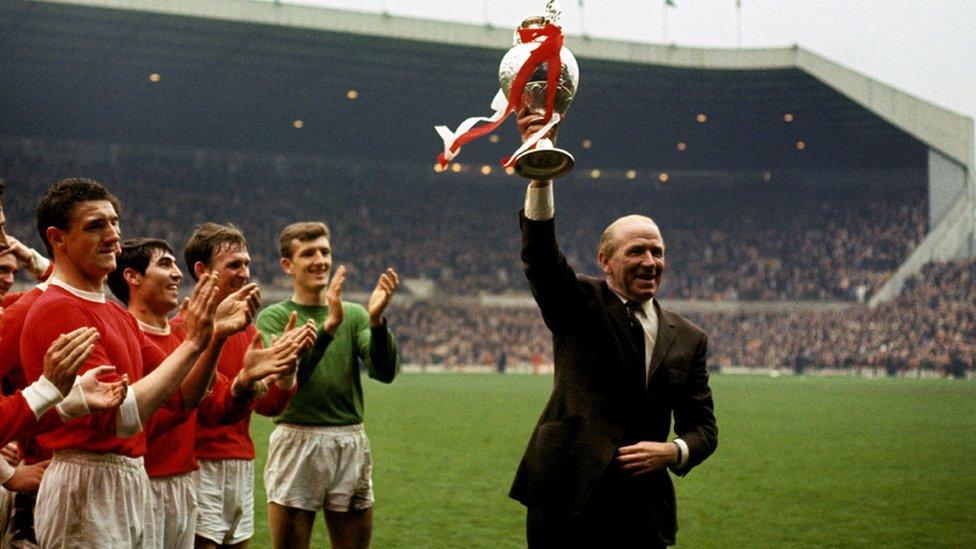
"If they're playing in your town, you must get to that football ground" as the old Manchester United Calypso goes
"I think [journalist and United fan] Michael Crick said it beautifully in the film that they dovetail together and eventually you end up with a perfect XI in front of you of players who were playing exactly the Matt Busby way.
"To have that foresight at 48 is absolutely mind-blowing."
'Turning point'
The focus of the film is inevitably the 1958 Munich Air disaster, which took the lives of 23 people, including club staff, journalists and eight of Busby's young stars - including the imperious Duncan Edwards - on the way back from a European Cup tie in Yugoslavia.
The manager himself was left fighting for his life in hospital, lungs pierced and legs broken.
Pearlman believes the tragedy and the guilt he felt for taking them into Europe was "a big turning point for both Man United and Busby".
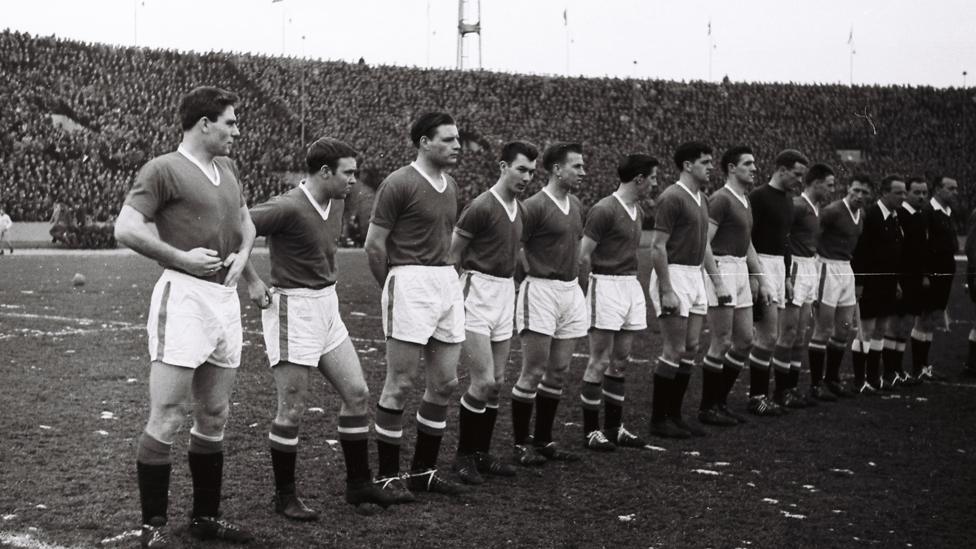
The "Busby Babes" line up for what would be their final ever match - versus Red Star Belgrade in the quarter-final of the European Cup in 1958.
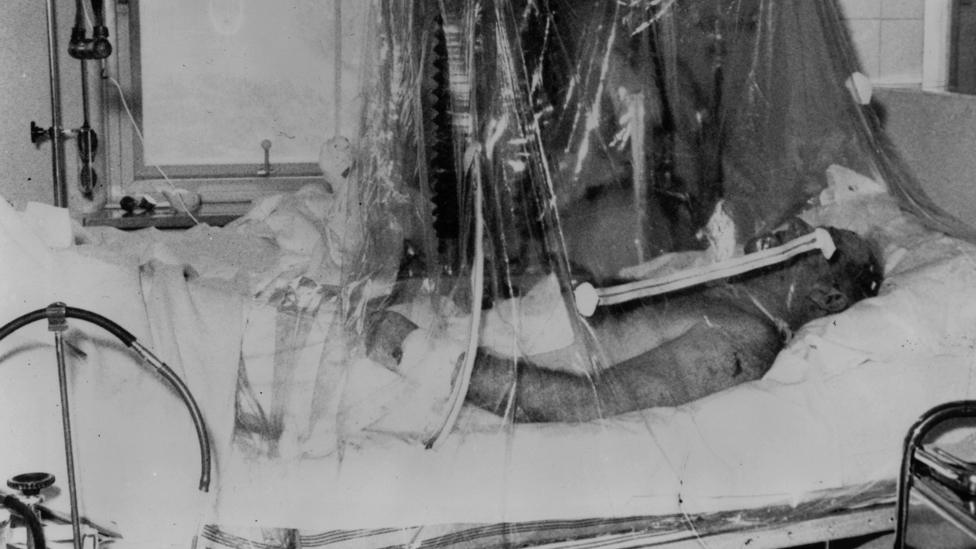
Busby in a Munich hospital bed in 1958
If it wasn't for his wife Jean demanding he carry on for "the boys that have gone", the film-maker thinks Busby would have walked away.
"You go from Matt Busby - the first-ever tracksuit manager, playing with the players and then Munich happens and he loses essentially his children and you take a step away.
"One of the first lines you hear from him, in an interview when he returns, is, 'Football is a business. It used to be a sport, now it's a business'.
"For him to say that - the man who adored the sport, he's clearly changed as a person. I think it was important for us to try and get that across."
The football taught by Matt Busby
Once he was back on his feet and had "got his head around it", Busby set about building another team for a new decade. Bobby Charlton, Denis Law and George Best all picked up Ballon d'Or awards, external (only Cristiano Ronaldo has achieved that in a United shirt since) as United lit up the terraces, winning leagues and cups with their equally "rock 'n' roll football".
Pearlman notes how Busby was constantly "at the forefront of each era".
"With the Babes he was the face of post-war England, bringing entertainment back to the working classes," he says.
"Then in the 60s he had Best, with his Beatles haircut, and that exciting team that epitomised that period of time."
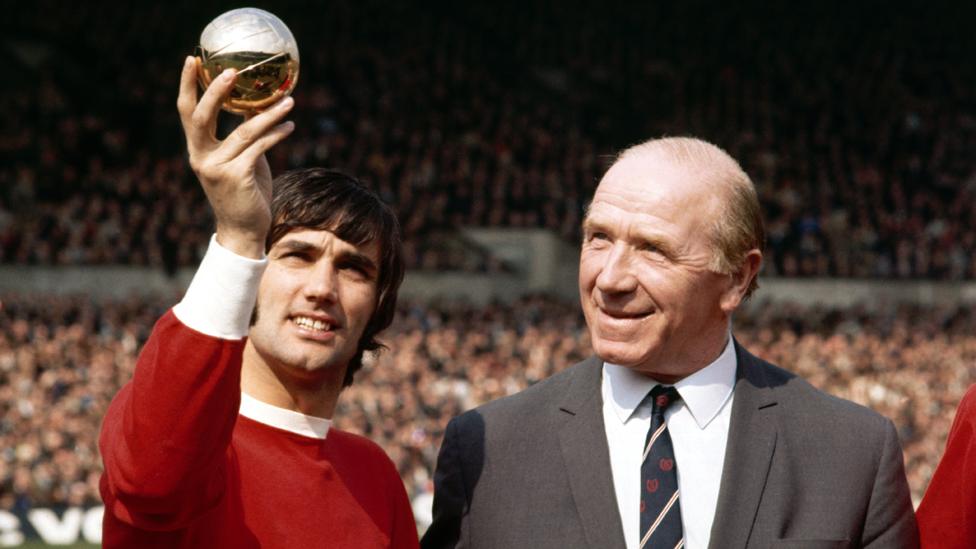
"El Beatle" George Best and Busby look at his Ballon d'Or trophy for world player of the year in 1968

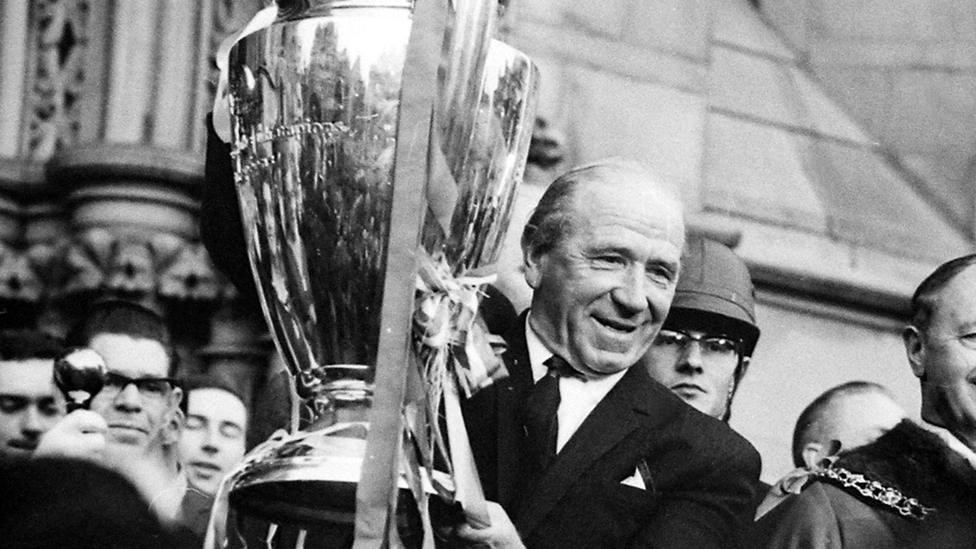
Manchester United have been champions of Europe three times - in 1968, 1999 and 2008.
Ex-midfielder Crerand declares on screen how they all wanted to win the European Cup for their manager. But when Busby's Holy Grail was finally found in '68 it was bittersweet because of the ghosts of Munich.
Aston, who now runs a pet food stall in Glossop, Derbyshire, was the second youngest player in that team at 20 and admits he found the experience all "very strange". It took him 10 years to fully understand the impact of what had happened to Munich survivors like Busby, Charlton and defender Bill Foulkes.
Allow X content?
This article contains content provided by X. We ask for your permission before anything is loaded, as they may be using cookies and other technologies. You may want to read X’s cookie policy, external and privacy policy, external before accepting. To view this content choose ‘accept and continue’.

"To rebuild in such a short space of time - not just to get the club up and running again, but to become European champions... It wasn't until I was 30 so when I sat down one day and I thought, what an achievement.
"After the game, people like Foulkes and Charlton didn't celebrate at all - they just went quietly to bed because they must have had their own private thoughts about the lads they'd played with and lost."
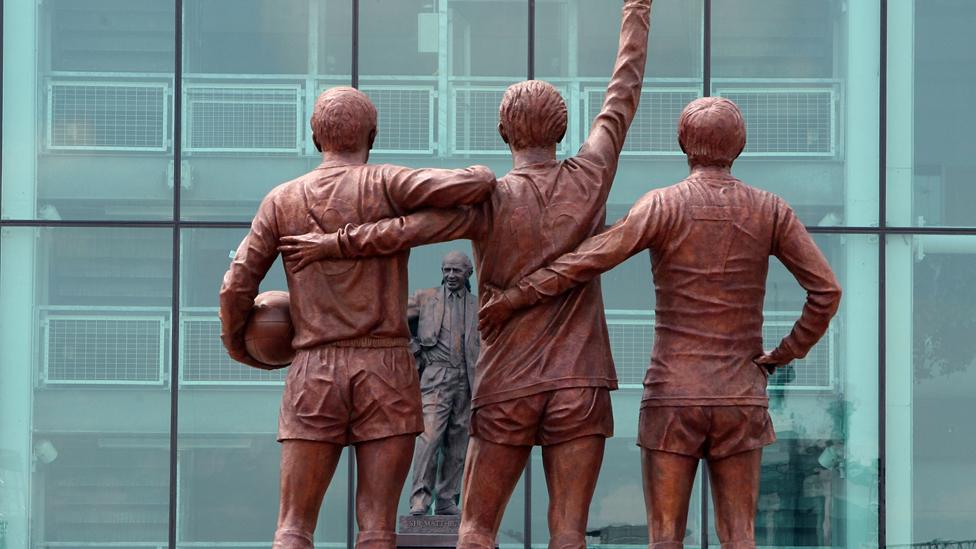
A statue of Sir Matt Busby stands outside Old Trafford today, opposite another one of three of his greatest players - Sir Bobby Charlton, Denis Law and George Best

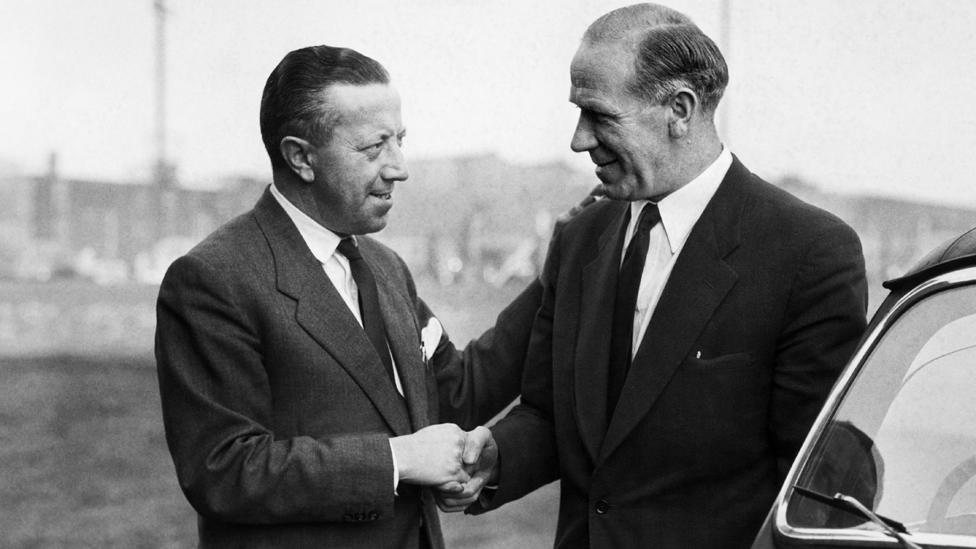
Jimmy Murphy led a makeshift United team to the 1958 FA Cup Final, while Sir Matt was still recovering from injuries sustained in Munich
While Busby changed the course of English football history, he didn't do it alone. He was aided by his trusted number two Jimmy Murphy - "the team talk king" - whom he met through the army football set-up.
Murphy missed the Munich air disaster because he was away managing the Welsh national team. His son, Jimmy Murphy Jr - who also appears in the film - says the pair were like chalk and cheese.
"Matt liked to go out and enjoy himself in restaurants, and play golf and have a bit of a gamble. My dad just liked a ciggie and a pint!"
If you're good enough, you're old enough
The press notes for the Busby documentary describe it as a kind of "prequel to The Class of 92".
Two graduates from that class, Ryan Giggs and Gary Neville, appear towards the end to show the through-line from the Busby Babes to Fergie's treble-winning Fledglings and beyond.
"Matt has a name that resounds around football, like Brian Clough or Bill Shankly - for different reasons - for producing a 'footballing' club," concludes Murphy.
"They emphasised that young players could make it... if given a chance."
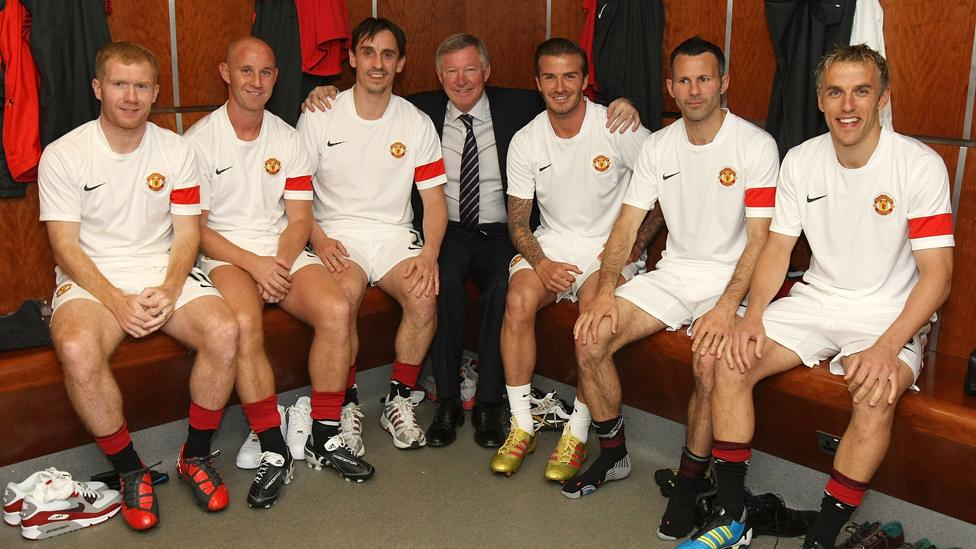
From the Busby Babes to Fergie's Fledglings - aka the Class of 92
Busby is in cinemas from 11 November, on digital on 15 November and on DVD from 18 November.
- Published9 August 2019
